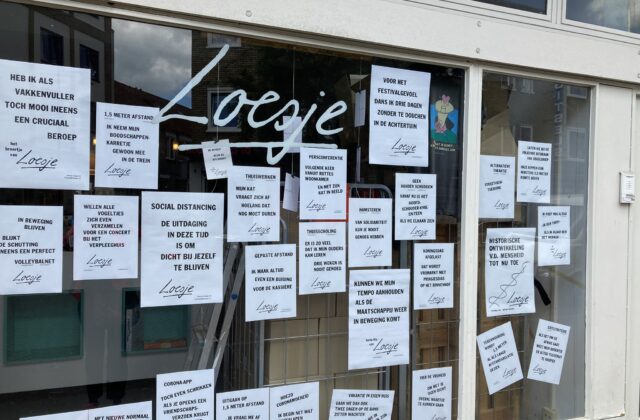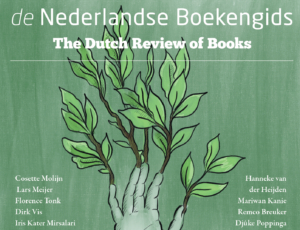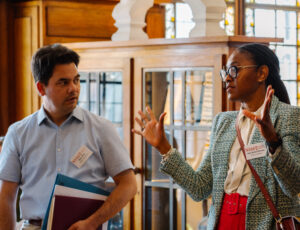Titilating posters shrouded in mists
“At the end of my money, I always have a chunk of month left.” It is one of the golden oldies among the thought provoking one-liners that poster collective Loesje is famous for. In the Netherlands, everyone knows Loesje, whose titillating posters started conquering Dutch streets in 1983. But the creative collective behind it has always shrouded itself in mists.
Fleur van der Bij, an accomplished journalist and NIAS fellow in 2022, gained access to the Loesje archives and spoke to the founders. Her research project at NIAS “From Provo to Loesje: Creative Activism in the Netherlands and Europe” served as a pivotal point in her journey toward writing the biography of Loesje, set to be published this month. The NIAS fellowship offered her the resources, expertise, and time needed to take a deep dive into the concept of creative activism, its historical context, and its profound influence on society.
From Arnhem to Warsaw and Ramallah
The activists behind Loesje wanted fellow citizens to think their imaginative messages came from a nice young, inquisitive, opinionated and humorous girl. Every poster was signed with her name. Her slogans, printed in sturdy capitals, first appeared in Arnhem and then throughout the country. Subsequently, Loesje went international and reached streets from Warsaw to Ramallah. The posters have a few things in common. They are mostly funny, thought-provoking and personal. A relevant example from recent years: “Where will the climate go when it needs a holiday.”
As fresh as ever
This year Loesje reaches her 40th birthday. Unique for creative activist initiatives, which usually have a short life span. Even as a middle aged adult, Loesje has remained as fresh, charming and contrarian as ever. Creative activism, an innovative approach to peaceful protest, has been a driving force behind societal change for decades. In the Netherlands, the roots of this movement stretch back to the Provo era of the 1960s and have continued to evolve through subsequent generations. The Provo movement, established in 1965, stands as a pioneering force in the realm of playful activism. The Dutch group executed simple yet unorthodox actions. They are famous for distributing free raisins to the public and implementing the “white bike plan,” making white bicycles available for free public use in Amsterdam. Their actions not only defied societal norms, they sparked meaningful conversations about the possibilities of societal transformation.
Born in the grim 80s
During her interactions with the founders Van der Bij discovered that Loesje arose in response to the grim atmosphere of the action groups of the 1980s. At demonstrations, every slogan began with “STOP” or “AGAINST”: against nuclear power, against capitalism, against housing shortage. “The fun was gone,” says Van der Bij. “They were no longer capable of reaching the public.” Six activists in Arnhem asked themselves: what if we were in favor of something? What if we look at the world with wonder? What if we seek connection instead of confrontation?”
Loesje was born, they only needed to name her. And during a brainstorm for a suitable name in their local pub, an art school student walked in. You can guess what her name was: Loes. At the time, the positive activism that Loesje brought into the world was no less than revolutionary. The 1980s marked a significant shift in activism as Dutch action groups adopted more aggressive and confrontational methods, often leading to clashes with law enforcement during demonstrations.
Positive change
This shift away from peaceful activism lies at the root of initiatives as Loesje exploring alternative ways to create positive change. Besides exploring the remarkable and witty character of Loesje, and the impact of creative activism in general, the biography examines how this form of activism has contributed to social transformation in various European countries and contexts.
Creative activism continues to be an enduring and transformative force in the Netherlands and beyond, offering unique and imaginative ways to challenge established norms and promote societal change. Fleur van der Bij’s research project, conducted during her NIAS fellowship in 2022, serves as a testament to the importance of documenting and understanding the evolution of this type of activism and its impact on society.
Lenin’s agitprop
Loesje’s inventors were by no means naïve, the biography reveals. They were thoroughly versed in theory and drew on the ideas of Marx and Lenin. Loesje emerged from anti-capitalist minds, says Van der Bij. Internally, fresh members of Loesje followed a “dead serious education”, Van der Bij continues. The activists were taught writing techniques derived from Lenin’s agitprop: a contraction of agitation (works on the mind) and propaganda (works on emotion). “Agitprop was employed in Russia at the beginning of the last century to convey communist values to the large, illiterate masses. This was done through drama, but also through posters with short texts marked by inversion, association, exaggeration and suggestion. The Loesje creators rediscovered those techniques.”
The creators had the flexibility to turn heavy communist theory into cheerful, positive sayings. Van der Bij: “They saw Loesje not as a girl, but as a means to overthrow capitalism and break social patterns.”





